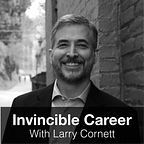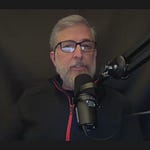
The past two weeks have been interesting and challenging. I was selected for jury duty service here in California, and I have a few weeks left in the trial. The process has been taking up most of the time I usually spend writing, recording my podcast, and working with my clients and community.
As a result, I’m not entirely happy with my progress on the latest chapter of the book I’m writing. It’s about 80% of the way there, so I need more time to wrap it up before sharing the draft with you.
So, instead, I will try something new this week! I’m frequently asked career-related questions across various platforms. Instead of answering there, I will share the questions and my answers with you here.
By the way, if you would like to ask me a question about anything related to work, careers, interviews, etc., there are many ways you can do that:
Reply to the weekly newsletter email and send me your question.
Post your question in the comments section of an article.
Send me an anonymous written question.
Record an audio question, and you can have your voice included in an upcoming podcast episode!
Note: Please let me know if you’d like to have your name included or if you prefer to remain anonymous. For example, I can disguise your voice in the podcast.
Now, without further ado, let’s dive into the six questions below!
Question 1
“Has working remotely part-time or full-time enhanced your well-being?”
Absolutely! I have been working primarily remote for more than 12 years now and full-time remote for more than six years.
I used to commute 2–3 hours every day for my last corporate job. I was overweight, unhealthy, and unhappy. I didn't see my family much during the workweek.
Once I went remote running my own business, I started working out more often and eating healthier — after I recovered and repurposed those 2–3 hours every day. I lost 40 lbs! If you check out my Instagram, you'll see that I'm still working out every day.
I was also able to spend more time with my children and eat dinner with my family every night. I go for a walk and run with my wife almost every day. My mental and emotional health are so much better now.
Anyone who has read the advice in my newsletter knows that I'm a huge fan of remote work. I coach clients to take control of their working lives so they can work where they want and when they want. It's a life-changing experience!
Question 2
“What job or profession is a lot less fun than people imagine?”
I think many professions look more fun from the outside than they do on the inside. For example, I was a software/web/app designer for much of my career. My friends and family (who don’t work in tech) would frequently comment that my job must be “fun” because I just had to sit around and design stuff all day.
I think they confused “design” with creating art, which I actually do enjoy quite a lot. But, I can tell you that the actual profession of software design isn’t all fun and laughs. It’s a ton of long hours, arguments over requirements and design decisions, endless revisions, tedious documentation, etc. Sure, there are some fun moments, but probably no more than other professions.
Likewise, I think television shows have misled us into believing that the lives of doctors, police officers, and lawyers are a lot more exciting than they really are. My brother is a surgeon, so I know he isn’t having “fun” very often on the job. I used to be a police dispatcher, so I know that most of the job is boring and full of process and paperwork (briefly interrupted by rare moments of terror).
I’m sure that many of us look at the lives of professional athletes, music artists, and actors and think, “That must be nice! I sure do wish I could get paid to play like that.” But, there’s a reason that many of them struggle with substance abuse, depression, and failed relationships. The professions aren’t as glamorous as they look from the outside.
Question 3
“What are the considerations before making a career change?”
This is a tricky question to answer because I don’t know how significant the planned career change is. So, my first follow-up question would be, “What type of career change?” Obviously, a massive change will require more serious consideration and preparation.
Do you know what you're getting into? You should talk to people in the career/profession you’re considering. Explore what the job is like by receiving training, shadowing someone, etc.
I have some friends who have considered opening restaurants and bars. However, after spending a few days as a chef, they changed their minds.
Do you need a financial cushion? Depending on the career change, you may need funds to bridge the gap while your new career is spinning up (i.e., before it provides enough income to support you). This is often the case if you quit your job to become an entrepreneur. It takes some time for a new business to provide a reliable and sufficient income stream.
Will the career change require a lifestyle change? Are you prepared for that? For example, sometimes your commute or working hours will be pretty different when you change to a new profession. You should also be prepared for the impact it may have on your circle of friends. I lost quite a few “friends” when I left my tech career behind to become a leadership and career coach.
Finally, what’s your backup plan if the career change doesn’t work out? Failure is a possibility, and it can happen. Hey, my tech startup failed, and I had to quickly come up with my Plan B to keep going. So, be prepared with a backup plan ahead of time (just in case).
Question 4
“What (if any) new careers are open to you if you are nearing 60?”
Even though age discrimination is illegal and the law protects people age 40 or over, we all know it still happens. It’s a massive issue in tech, and I encountered it several times. Unfortunately, it’s hard to prove age discrimination.
So, it’s wise to plan ahead and be ready for the inevitable slowdown in opportunities that used to flow your way when you were younger. I started planning my future as I approached my 40s because I could already see where things were going. I intentionally guided my career in a direction where my age would be viewed as an asset, not a liability (e.g., management, leadership, consulting).
Some examples of pivoting into a second-act career:
Successful actors become directors before they age out, and it’s too late (e.g., Ron Howard, Penny Marshall, Jodie Foster).
Hot music artists start their own record label before they grow weary of touring (e.g., Jay Z, The Beatles, Dave Grohl).
World-class athletes know when to hang it up and transition into coaching (e.g., Bill Russell, Martina Navratilova, Mike Ditka).
Careers for older folks:
Many older employees move into consulting when they feel their career slowing down within the walls of a corporation.
People like me leave the corporate world, become coaches, and advise the next generation of leaders.
Some people realize that they can’t be forced into “early retirement” if they start their own business and become their own boss. I know many business owners over the age of 60. My optometrist owned his practice and just retired this year when he was over 90!
Teaching at a local school or college is a good option and lets you give back to the next generation.
I’ve watched people retire from their first career and go into real estate. It’s a job that values your experience and connections.
Writing is another career that is open to anyone, no matter their age. No one knows how old you are behind the keyboard!
Finally, I know several people who indulged their artistic talent and became artists in their second-act careers. I interviewed one talented lady for my podcast.
As you may have guessed, some of these second-act careers won’t pay as well as your first-act career did when you were younger. So, plan accordingly. I think you’ll enjoy this article; A new start after 60: ‘I became a psychotherapist at 69 and found my calling.’ You might find this one interesting, too.
Question 5
“How many careers did you have before your current one?”
I guess it depends on how you define a “career.” I’ve had many different jobs in my life, but I wouldn’t classify any of the earlier ones as a career to which I dedicated a significant amount of my professional life.
Before I became a leadership and career coach, I spent most of my professional life in one career in tech. I was a designer, design manager, design leader, product executive, and startup founder and CEO. But, I would put all of those jobs under the umbrella of my “tech career.”
I will say that the idea of having one primary career for life is outdated. My professional life has changed considerably about every ten years. I would guess that many of you will change careers more than once in your lifetime, as well.
Question 6
“What do you do when your business direction is becoming more risky and you feel like your life is taking too long to get to where you want to be? Mildly bittersweet and having a lot of hindsight about my past life right now :(“
One of my most popular articles ever was on this very topic. What does “too long” mean? Are you comparing yourself to someone else?
The focus on “where you want to be” reveals what is known as the Arrival Fallacy. Many of us experience it at a few points in our lifetime.
"Arrival fallacy is this illusion that once we make it, once we attain our goal or reach our destination, we will reach lasting happiness."
— Tal Ben-Shahar
When you dream about the destination and keep thinking that reaching it will be what makes you happy, you don’t enjoy your life along the way. I know this is easier said than done, but you need to enjoy the journey too. Too many people experience a letdown when they reach their big goal. They feel like, “Is this it? Shouldn’t I feel happier now?”
Now, your comment about your business direction becoming “more risky” is a valid concern. My follow-up question is, “What do you mean by that?” You should continuously evaluate progress and how things are going. Sometimes, it is time to cut your losses and move on. But I don’t know enough to tell you if you’ve reached that point yet.
So, what do you think? Do you enjoy these Q&A articles? Let me know!
Again, feel free to comment on this article if you’d like to ask me a question.
By the way, there is a great way you can support my work without spending any money on a premium subscription:
📣 Recommending my newsletter on social media!
It only takes a few seconds, and it helps grow my business so I can continue making time to write it.
I’ll even provide some copy and paste text to make it easy to share on Twitter, Reddit, LinkedIn, Facebook, etc. Thanks in advance!
I've really been enjoying the Invincible Career newsletter by Larry Cornett (@cornett). If you want to get ahead at work and be happier in your job, but you aren’t subscribed yet, you’re missing out.
https://newsletter.invinciblecareer.com
Larry Cornett is a leadership coach and business advisor who hosts a private mastermind community for ambitious professionals with weekly challenges, office hours, and confidential support. If you’re interested in starting your own business or side hustle someday (or accelerating an existing one), check out his “Employee to Solopreneur” course (launching later this year).
Larry lives in Northern California near Lake Tahoe with his wife and children, and a gigantic Great Dane. He does his best to share advice to help others take complete control of their work and life. He’s also on Twitter @cornett.












